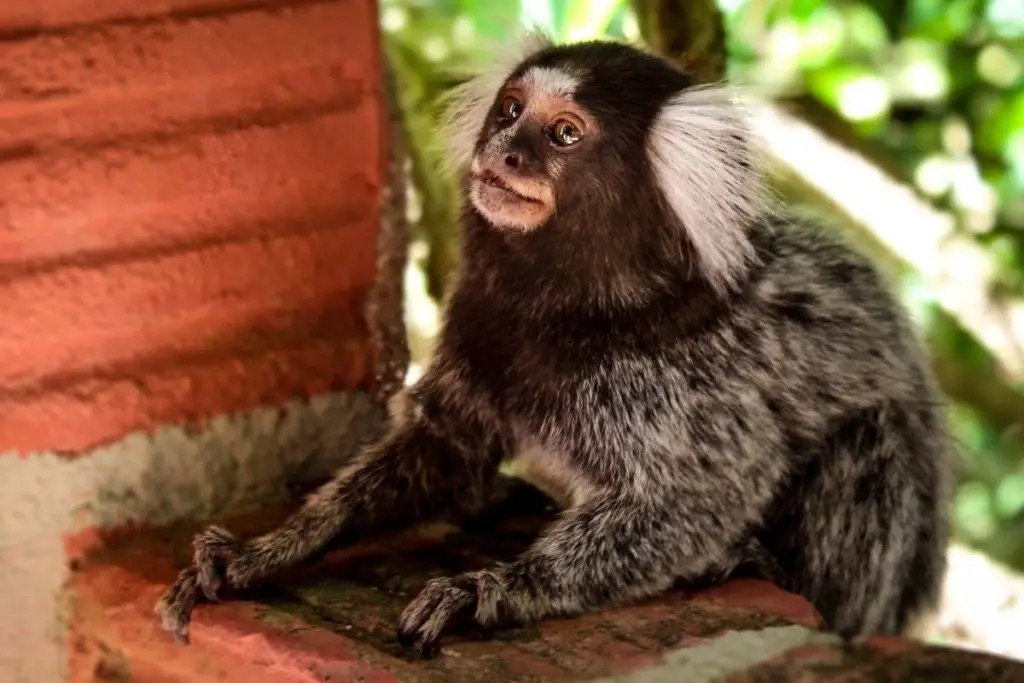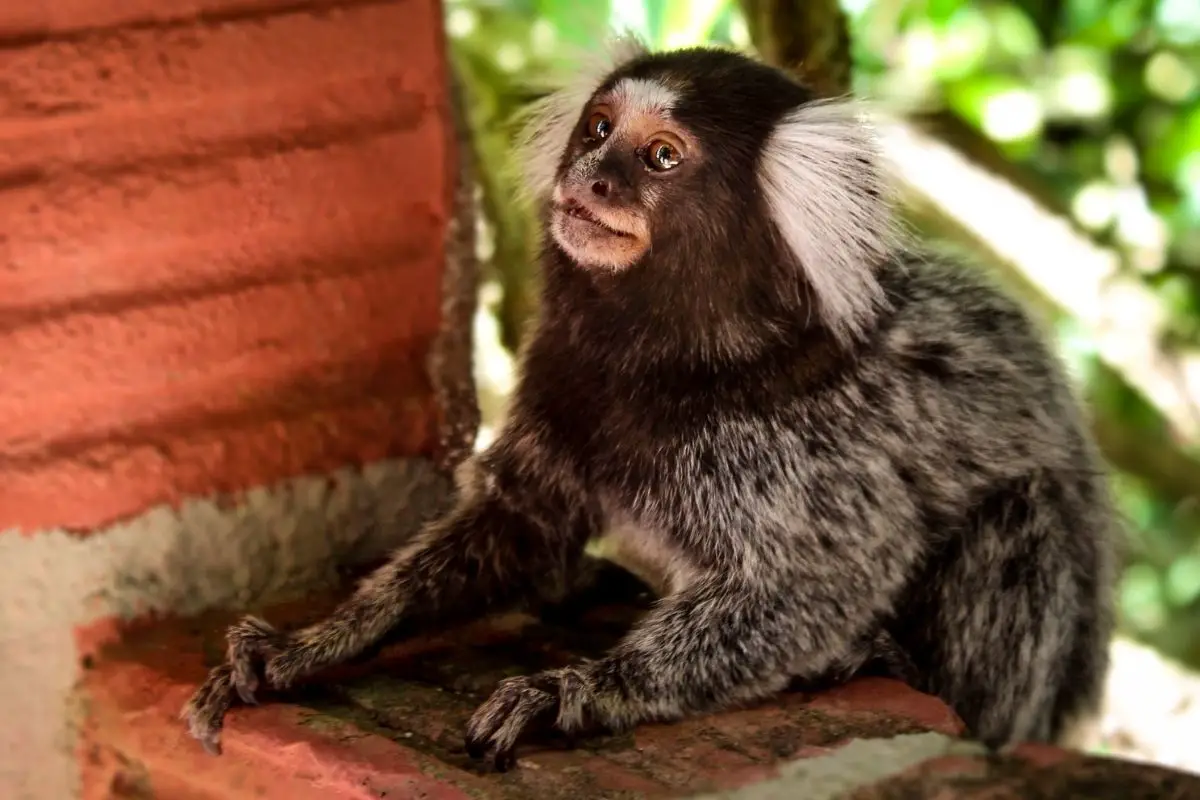Pocket monkeys have become a popular pet for people who want something small and adorable. People thing that since they are very small, they must also be very easy to care for, as they need a lot less space than a cat or dog would.
So, is this true? What even is a pocket monkey and can you have one legally?
Let’s start with the most important one:
What is a pocket monkey? A pocket monkeys is a Cabuella Pygmea, a monkey species that measures just as large as a finger at 6 inches when adult (14-18 centimeters) and weigh only 3.5 oz (100 grams). They are legal in some states in the US like Alabama, South Carolina, and North Carolina, while illegal or require a permit in other states
To learn how much they cost, whether you can keep one legally as a pet in your state, and what else you need to learn before you make your decision, keep reading.
Contents
What is a pocket monkey?

A pocket monkey is the Cabuella Pygmaea, or as is commonly referred to, the Marmoset. It’s also known as the Pygmy marmoset, which is the more official name for it.
Pygmy marmosets are the tiniest monkey breeds, affectionately called the finger monkeys. They are native to the rainforests of South America’s western Amazon basin and weigh about 100 grams.
These tiny animals are not only adorable, but they are also fascinating, and in this article, we’ll look at why they’re so popular, whether you should buy one, and if they should even be kept as pets.
The “thumb monkeys” frenzy has swept the internet, with pictures of them popping up all over. While conservationists and primate specialists are concerned about it, it’s clear that it’s a growing trend.
But, do they even make good pets?
Are Pocket Monkeys good pets?
Pocket Monkeys can make good if not great pets if you are willing to put in the time, effort, and money needed to get and train one.
They can be trained to do many things, including walking on a leash and climbing the curtains!
Pygmy marmosets have a variety of impressive abilities, including turning their heads all around and leaping higher than many monkeys that are bigger than they are!
Here are some of their most impressive abilities:
Incredible Jumping Abilities
Pygmy marmosets can leap far higher than other monkeys, even those considerably larger. How high, exactly? Almost 15 feet! That’s a huge achievement for an animal that fits in the palm of your hand!
The size of their … tails is impressive
The adult finger monkey has a 4.6-6.0 inch (117-152mm) head to body length and a considerable tail!
Their tails can grow up to 6.8-9.0 inches (172-229mm), which is larger than their body size. Quite impressive for such a small monkey.
They can rotate their heads in full circles
Yes, just like owls, finger monkeys have the impressive ability to rotate their heads 180 degrees. Full circle head turns are, well, head-turning.
Here is a quick video to learn even more about Marmosets:
So, they are quite impressive animals, and they can do things that almost no other pets can do, but, can you even get them legally?
Are Pocket Monkeys legal in the US?
Yes, you can legally own a pocket monkey in all of the states that allow you to privately own monkeys.
Pocket Monkeys can be legal in some states of the US but illegal or require a permit in others.
Here are the states where it’s completely legal for you to get a pet monkey, including pocket monkeys:
- Alabama – legal to own with a permit from county/city government
- Arkansas – legal to own if the animal was obtained before January 1994 and registered with local authorities
- Florida – legal to own with registration with county/city government
- Indiana – legal to own if you can prove that your state or country allows it and can provide proof of rabies vaccination
- Mississippi – legal to own as long as the animal is registered, has a health certificate, etc.
- Nebraska – requires license from Department of Agriculture
- Nevada – legal to own as long as your state or country allows it and can provide proof of rabies vaccination
- North Carolina – requires registration with county/city government
- North Dakota – can have a pet monkey if from an accredited school for training, scientific institution, etc. but must be accompanied by someone who has experience in keeping primates
- Ohio – can have a pet monkey if from an accredited school for training, scientific institution, etc. but must be accompanied by someone who has experience in keeping primates
- Tennessee – legal to own as long as your state or country allows it and can provide proof of rabies vaccination
- Texas – legal to own with registration with county/city government
- West Virginia – can have a pet monkey if from an accredited school for training, scientific institution, etc. but must be accompanied by someone who has experience in keeping primates States where it is illegal to keep one as a pet:
- New York – can only own with a permit and special licenses; fines may also apply
You can learn more about the laws of each state in this article on where you can and where you can’t own a pet monkey legally.
How much does a Pocket Monkey cost?
The cost of a baby marmoset can range from $4,500 to over $10,000. The price varies depending on the age and sex of the monkey. Monkeys are not only costly pets; they are also not the most costly, as that title belongs to pet Chimps, which may cost up to $60,000 or more.
They are also quite expensive to care for, and you can expect to pay thousands in food, vet bills, and diapers throughout their lifetime.
You can learn more about how much you should expect to pay for the care of your pet monkey in this article where I break down every cost of owning a pet monkey.
What do Pocket monkeys eat?
Pocket monkeys eat a diet of fruits, vegetables, grains and insects.
Pocket monkeys eat a very specialized diet consisting largely of fruit-based monkey food mixes that you must buy for them from a breeder or in the wild animal section at your local pet store. You can also feed pocket monkeys what they would naturally eat in the wild: bananas, grapes, apples, and insects.
Do Pocket Monkeys bite?
All Monkeys bite, including Pocket Monkeys. Monkeys can bite when they feel threatened or if their food is taken away from them.
Pocket Monkeys are very good pets to have and can be easily trained not to bite, but you should always be careful around any pet monkey whatever the type or history of the monkey.
How long do pocket Monkeys live?
Pocket monkeys live for about 12 years in the wild and 18 years in captivity, with some rare monkeys making it to 20 years or more when raised in ideal conditions.
If you like this article, please share it!


